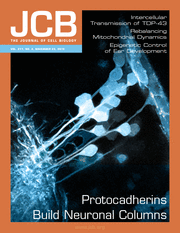
最新的The Journal of Cell Biology杂志在线发表了法国卫生和医学研究所关于exosome分泌调控机制的最新研究成果.

外泌体是由多泡小体(MVBs)与细胞质膜融合后释放到细胞外的一种膜泡。尽管我们已经知道外泌体具有重要的生物功能,但调控其形成和分泌的分子机制尚不清楚。研究人员利用线虫和哺乳动物肿瘤细胞研究发现Ral GTPases参与了外泌体的形成。在线虫里RAL-1定位于分泌型多泡小体的表面。对RAL-1缺失的动物细胞进行电镜结果的定量分析发现RAL-1既参与了多泡小体的形成又参与了多泡小体与细胞质膜融合的过程。这些功能并不参与胞外复合体(Ral GTPase 效应器)。更重要的是,他们发现RAL-1的靶蛋白SNARE蛋白中的SYX-5与RAL-1的活性形式在细胞质膜上共定位。当SYX-5缺失时,MVBs会在细胞质膜下聚集。在哺乳动物中,RalA和RalB均参与培养细胞的外泌体样的膜泡的分泌。因此,Ral GTPases是一种新的调节MVBs的形成和exosome的分泌的蛋白。
原文来源:Hyenne, V., et al. (2015). RAL-1 controls multivesicular bodybiogenesis and exosome secretion. J Cell Biol 211(1): 27-37.
Abstract: Exosomes are secretedvesicles arising from the fusion of multivesicular bodies (MVBs) with theplasma membrane. Despite their importance in various processes, the molecularmechanisms controlling their formation and release remain unclear. Usingnematodes and mammary tumor cells, we show that Ral GTPases are involved inexosome biogenesis. In Caenorhabditis elegans, RAL-1 localizes at the surfaceof secretory MVBs. A quantitative electron microscopy analysis ofRAL-1-deficient animals revealed that RAL-1 is involved in both MVB formationand their fusion with the plasma membrane. These functions do not involve theexocyst complex, a common Ral guanosine triphosphatase (GTPase) effector.Furthermore, we show that the target membrane SNARE protein SYX-5 colocalizes witha constitutively active form of RAL-1 at the plasma membrane, and MVBsaccumulate under the plasma membrane when SYX-5 is absent. In mammals, RalA andRalB are both required for the secretion of exosome-like vesicles in culturedcells. Therefore, Ral GTPases represent new regulators of MVB formation andexosome release.
版权归 外泌体资讯网 所有,未经书面许可,禁止转载。联系邮箱exosome@exosome.com.cn





